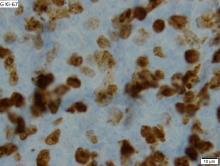Autologous hematopoietic cell transplantation (AHCT) was linked to improved progression-free survival, but not improved overall survival, in a retrospective cohort study including more than 1,000 mantle cell lymphoma (MCL) patients.
Use of consolidative AHCT was associated with improved progression-free survival even after the researchers controlled for disease severity in this cohort of younger, transplantation-eligible patients treated in the rituximab era, according to Stefan K. Barta, MD, of the University of Pennsylvania, Philadelphia, and his coinvestigators.
There was no such link between AHCT and improved overall survival in a propensity score–weighted analysis, though certain subgroups did seem to have an overall survival benefit, such as patients with high-risk features, Dr. Barta and his colleagues reported in the Journal of Clinical Oncology.
By contrast, other recent studies have found an association between consolidative AHCT and improved overall survival in MCL, including another recently reported retrospective analysis of 10,000 patients in the National Cancer Database.
The lack of overall survival improvement seen in the present study may be due to effective salvage therapy with novel agents or additional transplantation, abrogating any improvement that otherwise might be attributable to AHCT, Dr. Barta and his coauthors said in a discussion of their results.
The present analysis included 1,029 transplantation-eligible adults aged 65 years or younger with a new diagnosis of MCL, who were treated between 2000 and 2015 at one of 25 medical centers. About two-thirds of the patients underwent consolidative AHCT.
With a median follow-up of 76 months, median progression-free survival was 62 months, and median overall survival was 138 months, the investigators reported.
While AHCT was linked to improved progression-free survival and overall survival in an unadjusted analysis, subsequent analyses showed only a trend toward improvement or no improvement in overall survival.
Specifically, AHCT was associated with improved progression-free survival in multivariable regression analysis, with a hazard ratio (HR) of 0.53 (95% confidence interval, 0.43-0.66; P less than .01) and in propensity score–weighted analysis (HR, 0.70; 95% CI, 0.59-0.84; P less than .05).
By contrast, AHCT was associated with a trend toward improved overall survival in the multivariable analysis (HR, 0.77; 95% CI, 0.98 to 1.01; P = .06) and no improvement in overall survival in the propensity score–weighted analysis (HR, 0.87; 95% CI, 0.69 to 1.10; P = .24).
A subgroup analysis conducted after the multivariable analysis found that overall survival improvements were seen only in patients who received CHOP-like induction or induction without cytarabine, or those who had blastoid or pleomorphic variant or who scored high on the MCL International Prognostic Index.
Randomized trials are “urgently needed” to determine the true benefit of consolidative AHCT in MCL, Dr. Barta and his coauthors said, since some subgroups likely derive minimal benefit from it, including patients with TP53 mutations or those who are minimal residual disease (MRD) negative following induction.
One such study is EA4151, an ongoing randomized, phase 3 clinical trial, which is evaluating consolidation with AHCT followed by maintenance rituximab versus maintenance rituximab alone for MCL patients in MRD-negative first complete remission.
“With this and other well-designed prospective trials as well as with well-validated predictive biomarkers, clinicians will be better able to provide a more refined, risk-adapted approach to first-line management of MCL,” the investigators said.
Dr. Barta provided no disclosures related to the research. Coauthors had disclosures related to Sanofi, AstraZeneca, Celgene, Adaptive Biotechnologies, Janssen Oncology, Seattle Genetics, Genentech, Pharmacyclics, Merck, Bristol-Myers Squibb, and others.
SOURCE: Gerson JN et al. J Clin Oncol. 2019 Jan 7. doi: 10.1200/JCO.18.00690.


